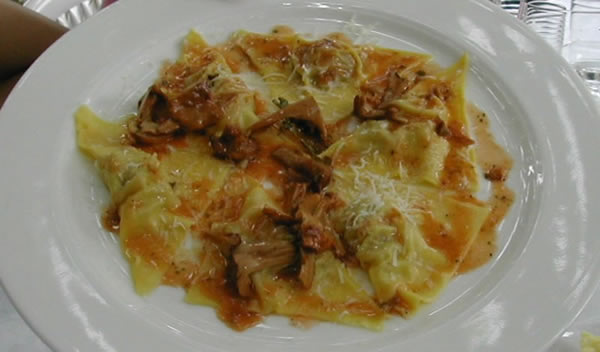^ ravioli at Lanterna Verde – yum!
One of the most boring things in the world is listening to people talk about their diet (hearing them complain about their weight runs a close second). However, in America today there’s nothing to discuss, because everyone is on the Atkins diet (no carbohydrates, but you can eat as much of anything else as you want).
Food companies and advertisers have been swift to adapt. In the supermarket I saw “low-carbohydrate bread.” I did not read the label to learn how they accomplished this miracle; I had a feeling it would involve chemicals I’d never want to put into my body.
Magazine articles, books, and news items give alarming statistics about obesity, and offer ways to combat it, both in yourself and your children. It seems to me that maintaining a healthy weight is not rocket science, and doesn’t require a diet plan that you have to buy a whole book about, let alone pre-packaged diet meals with counted calories etc. etc. Didn’t we all learn the basics of nutrition in school, the four major food groups and all that? The major lesson I remember is that it never hurts to eat more fruit and vegetables, especially when those replace starches, fats, and sugars in your daily intake.
Perhaps what Americans really need is to revise their attitude towards food. Food seems to occupy two diametrically-opposed places in American consciousness. On the one hand, food is simply fuel – you shovel in whatever comes to hand, to keep you going. It’s this attitude that leads to families rarely eating together, as everyone is rushing off to their extra-curricular activities, grabbing whatever they can to eat along the way.
But food also has a psychological role. Cookbooks, menus, and people tout the concept of “comfort food,” which, when eaten, is supposed to make you feel secure or loved, perhaps by reminding you of your childhood. (Never mind that most of us never had this mythical comforting childhood or that kind of food with it.)
Comfort is a very dangerous role for food to play. You hear the same story over and over again: “I wasn’t overweight, but then I went through a rough patch and felt depressed. I turned to food for comfort, and became a blimp.” At the blimp stage, food is re-cast as the enemy, the secret sin, and the indulgent reward for good behavior (most often, diet-related good behavior: “I was good today, I only had salad for lunch, so I’m entitled to have a brownie now”).
The attitude towards food is one area where Italy really gets it right. This attitude is made explicit by the Slow Food movement, but I think is pervasive throughout Italian culture. In Italy, a meal is neither mere refueling nor comforting self-indulgence. It’s a time for a family to be together, to enjoy good food and each others’ company. It’s not something to be rushed through, neither in preparation nor in consumption. So dinner is eaten far later than in the US, usually around 8 pm. Meals are spread over at least two courses, which also slows you down. You have time to appreciate the food and wine, and to talk to each other. And there’s no rushing through the meal to watch TV afterwards. (I have never heard an Italian, not even a child, leave the table on that pretext.)
The Italian style of family meal has several beneficial side effects. On the nutritional side, everyone tends to eat a more balanced diet, in part because parents are at the table with their kids to ensure that they eat what’s good for them. Taking your time over a meal also ensures that you digest it better. And spending time together is good for families: you know what’s going on with each other.
Needless to say, the Atkins diet is not taking off in Italy, the home of pasta, risotto, polenta, and tasty, crusty bread. Thank god.


I believe children in the US are spoiled when it involves eating. When my children were growing up we always sat at a table together. We seldom ate fast food. Sometime we would go to a pizza parlor on a pay day (2 weeks). Back then money was stretched by cooking at home and cooking was an adventure (no prepared TV dinners and junk chemicals). Janelle